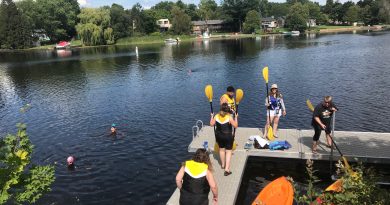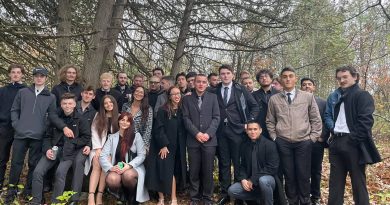Steps Taken To Ensure An Enjoyable Return To School
By Carleton MPP Goldie Ghamari
As students head back to class after two difficult years of pandemic-related disruptions, there have been many steps taken to ensure a normal, stable and enjoyable return to school with the full-range of extracurricular activities students want and deserve.
The province has made nearly $1.5 billion available to Ontario’s publicly-funded education system (both English and French) to support learning recovery and renewal. This includes an approximate 2.7% increase (or $683.9 million) in the Grants for Student Needs (GSN), bringing the 2022-2023 total GSN investment to $26.1 billion.
Because of this historic level of support, GSN funding on an average provincial per-student basis is estimated to rise by approximately $339 to $13,059, the highest amount ever.
The province also invested more than $500 million in the Priorities and Partnership Funding (PPF) to fund approximately 150 initiatives that include a focus on math, student resilience and mental well-being. These initiatives include:
• $176M to expand access to free school-based tutoring;
• A further $225M going directly into the pockets of families so that students may access learning resources;
• $304M to support temporary staffing, allowing school boards to hire approximately 3,000 additional temporary staff, from teachers, to custodians to EAs; and
• $90M – including an additional $10M in new funding – for student mental health resources.
These initiatives are in addition to the base PF of $282 million.
Tutoring Supports
On August 9, the Ontario government announced an investment of $225 million in additional supports for parents to help their children catch up. This builds upon the previously announced $175 million school-based Tutoring Supports Program and aligns with the government’s Plan to Catch Up.
This funding is expanding access at school boards to free publicly funded tutoring in small groups both in schools and virtually, after school, during school, on weekends, and over the summer.
School boards are partnering with local community organizations that support learning in a trusted environment grounded in the language, culture and community norms for students.
On average, 49,000 students per week participated in tutoring programs in May and June 2022.
Each school board oversees the design and implementation of the tutoring supports program to meet the diverse needs of their students.
School boards were given direction to focus tutoring supports on students at risk who have been impacted by learning disruptions caused by the COVID-19 pandemic. School boards were also required to engage with local community organizations to help identify students at risk and seek their input and feedback regarding program delivery.
Educators and parents/guardians are also able to identify students who are in need of additional support and can make recommendations with respect to the level of intervention necessary (i.e., 1:1, small group, in-class supports, etc.).
Mental Health Support in Schools
To support student mental health and well-being in 2022-23, Ontario will be investing more than $90 million.
The ministry has also provided funding to third parties for development of programming and resources. This includes funding for the Kids Help Phone for the provision of 24/7 counselling supports for youth and the Ontario Federation of Indigenous Friendship Centres for Trauma-Informed Education Approaches Training in school.
The ministry’s implementation partner, School Mental Health Ontario, has developed a variety of culturally responsive and relevant mental health resources in English and French for system leaders, school leaders, all school staff, educators, parents/caregivers and students to assist in protecting, promoting and advancing mental health and well-being in schools that are available online.
There are many organizations that provide critical support for children and youth who face immediate mental health concerns or distress. A great example is Kids Help Phone, which offers 24/7 counselling and referral services across the province. To use this free resource, children can call 1-800-668-6868, or text CONNECT to 686868.
Consultations to Support Student Mental Health
In response to emerging evidence on student mental health and well-being needs, the Ministry of Health, with support from the Ministry of Education, is planning a cross-sector consultation to support child and youth resilience and mental well-being programs, services and supports within the continuum of care for Mental Health services in Ontario.
Beginning Fall 2022, consultations will commence with parents, students, child and youth mental health and education sectors, as well as other child and youth serving stakeholders, like children’s hospitals, on how to best support student mental health and well-being.
Capital Fair Wraps Up
There has been a theme in my column over the past few issues of the Manotick Messenger about the return to events in the community. One of the largest events in the Carleton riding each year is the Capital Fair, held at the Rideau Carleton Entertainment Centre.
This year’s fair was well-attended and brought a lot of smiles to a lot of faces. It was the first Capital Fair with no COVID restrictions since 2019. While attending the opening ceremonies of the fair, I couldn’t help but notice the feeling everyone seemed to have to be happy to have the fair back to what is considered normal.
One of the great things about the fair happens the day before it opens to the public. The Capital Fair hosts many physically challenged and mentally delayed children and their families to enjoy a private party and their own day at the fair before it opens to the general public.
The fair is approaching its 50th anniversary, as it began in 1975 as the Gloucester Festival of Friends. The festival grew into the Gloucester Fair, which took place on the grounds of the Earl Armstrong Arena. The fair was moved to the Rideau Carleton Entertainment Centre in 1998.
In 2014, the Gloucester Fair became the Capital Fair and has grown as a popular event not just in Carleton and throughout Ottawa, but also throughout Eastern Ontario and Western Quebec.
More Fairs to Come
The Richmond Agricultural Society (RAS) will be hosting the 177th annual Richmond Fair Sept. 15-18 at the Richmond Fairgrounds.
In August, I was pleased to join the staff of the fair and present them with a cheque for $54,500 from the Ontario Trillium Foundation’s Resilient Communities Fund. The money received will be used to create a clean and comfortable meeting room that can be used throughout the year by the fair’s board of directors, as well as by other members of the community.

After the presentation, we had some fun with the giant cheque used for photos and took it over to Scotiabank across the road from the fairgrounds to see if the RAS could cash it. They got a kick out of us bringing the cheque over, and said we would have to find an envelope big enough for the giant cheque!
Not to worry though, as the real cheque from the Trillium Foundation was already being processed.
Metcalfe Fair
Just a couple weeks after the Richmond Fair wraps up, the Metcalfe Fair will take place from Sept. 29 to Oct. 2.
This year’s fair will be the 166th annual event, hosted by the Metcalfe Agricultural Society.
According to the society, their current vision of the fair is to continue to provide, in co-operation and partnership with community groups and businesses, a high-quality agricultural exhibition for the betterment of the agricultural industry, and for the education, entertainment and enjoyment of our patrons.
My constituency office will have a booth set up at the fair, so please stop by and say hello while you are at the fair.
Office Notice:
My office is open Monday to Friday, 9 am to 4 pm. If you require assistance on any matter, please contact me at any time. My staff and I will be happy to assist. Even if it’s not a provincial issue, I’ll make sure to connect you with the proper office.
– Goldie
Your voice at Queen’s Park






